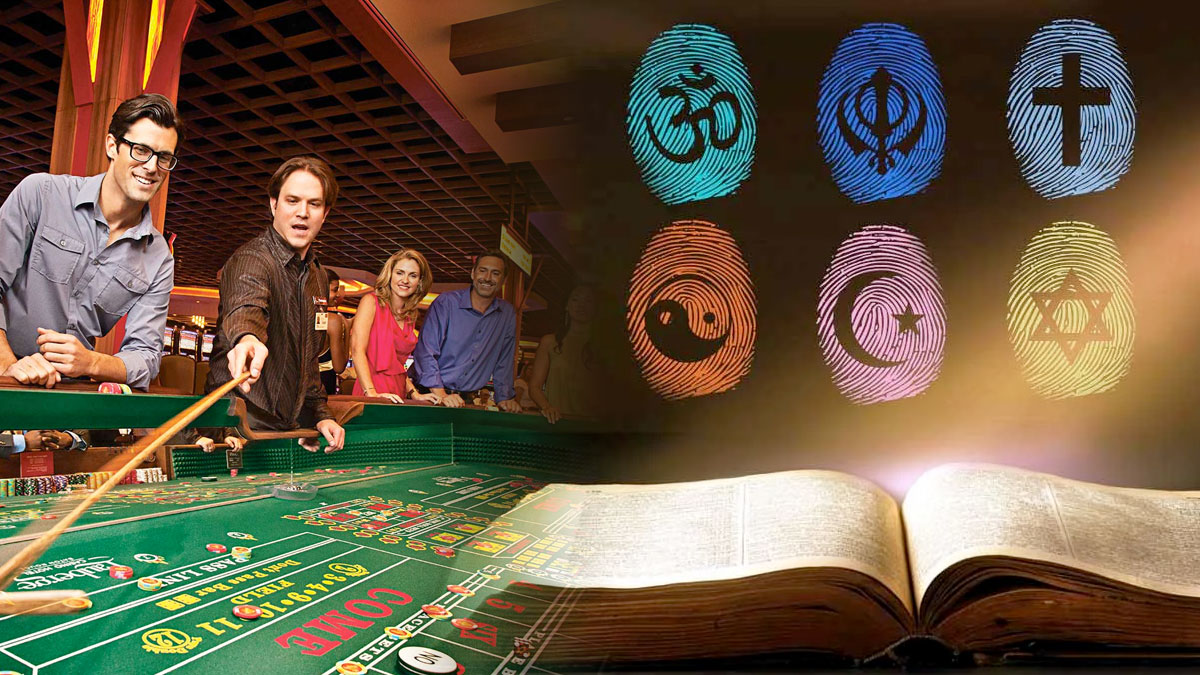Most of us see nothing wrong with playing the lottery or betting as long as there is no addiction. That’s backed up by statistics – according to a CBOS survey, about 50 percent of those surveyed participate in gambling. But what do the world’s great religions say about it?
History
Based on archaeological discoveries and historical evidence, we know that gambling has been around since ancient times. The oldest dice were found during excavations in Mesopotamia in 4000 BC.
Babylonian soldiers bet on horse racing, evidence of gambling can be found in hieroglyphs on the pyramid of Cheops.
Julius Caesar, Mark Antony, and Nero played dice.
The historic capital of gambling is Monte Carlo, where the first casino was opened in 1862. Nowadays, dice are no longer played. Cards, slot machines, lotteries or betting are much more popular. Just look at the websites of popular online casinos and you’ll see what kind of gambling is currently preferred by players. But can devout followers of a particular religion participate in them without worry?

Gambling according to Catholic doctrine, Islam and other religions
Catholicism
The Catholic Church has not officially issued any separate document on gambling, but condemns it in principle because it sees a high risk of addiction.
Some people tend to compare gambling to the snowball effect. As the snowball rolls down the hill, it gets bigger and rolls faster, making it difficult to control.
The metaphorical snowball effect is a process that begins with an initial state of little significance and accumulates on its own, becoming larger and larger (more serious), and possibly potentially potentially dangerous or catastrophic.
The addicted male gambler devotes all his attention to this very activity. Work doesn’t count, family doesn’t count, even money doesn’t count. The gambler cuts himself off from his family, doesn’t care about its development.
Just like alcohol, drugs or sex, gambling has devastating consequences; it makes the whole person sick.
It is also worth recalling the Youcat catechism for youth, prepared on the occasion of World Youth Day in Madrid in 2011. It states that “betting and gambling are immoral and dangerous when a player risks his livelihood. It is even worse when he risks the livelihoods of others, especially those entrusted with his care.
Islam
Gambling is strictly prohibited among Muslims, and these prohibitions are based on some so-called hadiths, which Muslims consider a record of the words and actions of the Islamic prophet Muhammad as well as the ayats of the Koran.
Muslim scholars interpret them in such a way that it is forbidden even to gamble in the stock market, which is a powerful branch of the economy in Western civilizations that is not considered gambling but business.
Among the followers of Islam there is a widespread belief that gambling interferes with religious duties and that people who devote themselves to it are not trustworthy. In some countries gambling is even subject to high fines!
Buddhism
Buddhism also considers gambling unworthy and inappropriate.
According to the teachings of the Buddha, a gambling addict is abandoned by his friends, is unfit for marriage, and is wasteful. Gambling leads to moral decay.

Judaism
Judaism, like the Catholic religion, has no specific record of gambling in its holy books. It is therefore assumed that as a form of entertainment, it is acceptable and reasonable to participate in gambling from time to time. A pathological addiction to gambling that results in the loss of property or the breaking of family ties is incompatible with Judaism.
As you can see, the world’s great religions are very careful about gambling, even something as widespread as cards and betting. Moderation, common sense, and responsibility are recommended – lest one fall into addiction.
Religion and gambling: compatible or strictly forbidden?
To follow religion means to follow and prohibitions. One of them is gambling. Gambling and gambling addiction by any of the religions puts a strict restriction. The beliefs of different nationalities explain these actions in their own way. Let’s start with the most common religion in the world, Christianity. Most of the inhabitants of our planet refer themselves to the followers of this faith.
The Bible is about gambling
The Christian view of gambling addiction is unanimous. Gambling, cards, and gambling addiction are evil and machinations of the devil. Christianity interprets the use of cards in everyday life exclusively as an appeal to the Evil One. Even card suits have an individual meaning for Christians. The cross of Jesus Christ is the suit of clubs. The spears used to mutilate the womb of Christ are the spades. The nails used to nail the body of the Savior to the crucifixion are diamonds. And finally, hearts are the vessel from which the martyr was given to drink. Christianity also harshly condemns fortune telling with cards.
Religion is also harsh with regard to the profits that come from gambling. The opinion of the clergy is unanimous – income should come only as a result of labor. Mental or physical – this is the next question. The main motive is that money should come not just as a result, but as a result of work. Christianity also condemns excessive abundance and wealth. Gambling is a constant attribute of these things. The Bible puts it this way: “The lot is cast in the floor, but all its decision is of the Lord.
Opinion of the followers of Islam
If the Bible says about gambling loyally, Islam is extremely categorical. Even seemingly harmless lotteries, dominoes, and backgammon are forbidden. The religion also classifies it as Satan and an abomination. For Muslims, the time devoted to prayer is extremely important. It’s hard to imagine what would happen to a self-respecting Muslim if he was busy drinking alcohol in a casino and rolling the dice during the allotted hour to turn to Allah. Muslimism harshly condemns and punishes any act of devotion to gambling. The prohibitions certainly apply to women, children and the elderly. The Koran speaks about gambling as follows: “There is a great sin in it, but there is also a benefit to men, though there is more sin in it than benefit” (Sura “al-Baqara”, “Cow”, verse 219).
Online casinos, poker, computer games: all prohibitions from the perspective of Islam
What games are Muslims forbidden to play? If we talk in general about the permissibility of computer games, scientists do not talk about a ban, because a person is free to spend his free time as he sees fit. There is a universal rule in Islam: “Everything that is not forbidden is allowed. If computer games do not push a person to disobedience and do not distract him from the prescribed prayer and his daily duties, then it is not permissible to speak of prohibition. But when games become an addiction and bring harm to a person, his religion, and relations with close relatives and households, then games will be forbidden for him as long as they lead to sin.
Is it permissible to conduct pranks on social networks? Is it permissible to prank a gift in exchange for likes or comments mentioning friends? The likes and comments should reflect real interest, not be put up for gifts? Time is the greatest treasure The foundation of everything, as we’ve said, is permissiveness. It is the same in games. However, we should not forget that we live life only once, and in the future life we will remain forever. In eternity we will reap the fruits of our labors or sins in this world. A believer uses his time wisely, not wasting it in vain and useless acts. You can tell how God-fearing a person is by looking at how he allocates his time. The more time he spends on meaningless or sinful activities, the less he fears Allah and judgment day. Forbidden in Games Various subjects and elements can be found in computer games that are clearly contrary to Islamic morality.
They can be divided into the following points:
- Mockery of religion. There are plots in games where the main character is fighting against Muslims, destroying mosques. Some games include a mockery of Islam or insults to God. These games are forbidden.
- Gambling. Modern fiqh scholars believe that it is forbidden to gamble, such as online casinos, poker and so on. All the more so if a person plays them for real money.
- The promotion of violence and sex. Many games contain pictures with naked characters. Looking at them is just as forbidden as looking at pictures of real naked people. For Muslims who still swear… When one tries to remind co-religionists of decency, they justify their weaknesses with righteous anger. But if anger is really righteous, then it must be controlled in a righteous way. Why else would he accept Islam if religion doesn’t make him a better person?
- Obscene Language. In multiplayer games, people play all together online. Usually in such games there are various chat rooms where people communicate with each other. Often chat rooms are filled with swearing and insults, which is reprehensible in Allah’s religion. The Prophet (peace and blessings of Allah be upon him) said: “It is not proper for a believer to swear or curse, or to utter obscenities or profanity.” A Muslim who plays such games should be especially careful not to participate in conversations in which people swear and insult each other.

Buddhism – about gambling or easy money
Buddhism also calls for the rejection of uncomplicated enrichment. Gaining financial wealth in this way is explained by this religion as the satisfaction of selfishness and passion. One cannot attain enlightenment if one makes a living in this way or, worse, if one squanders the money one earns. Buddhist monks will take on the sin even if they watch the process from the sidelines, since Buddhism requires not only self-organization, but also keeping one’s loved ones in line. Income must work for the well-being of the family. And with a gambling addiction, this is hardly possible. The basic message is to spend money wisely and give up the misery of losing.
People have spent and will continue to spend on entertainment. The modern world is impossible without treats, fun, and carefree living. The confession condemns not so much the game as the consequences-obsession. The debate on this subject goes on not only in gambling circles, but also among members of the clergy.
Regardless of a person’s faith and views, addiction to gambling has the following consequences:
- Problems in the family. Above all, the relationship between spouses and communication with children suffer.
- Spending one’s potential on the game rather than on more important matters.
- Playing during the work day or at night affects productivity.
- Whatever religion you are, your attitude toward gaming should be responsible, as a form of leisure, a fun way to spend time, not a way to make money.